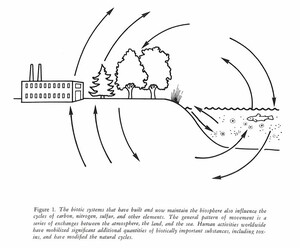Researchers at the Ecosystems Center study the biological and physical processes that occur in an ecosystem. Ecosystem ecologists, as they are known, define ecosystems as the smallest unit necessary to understand the complexity of nature. In the 1960s and ‘70s, ecologists studied the abundance and movements of the elements carbon, nitrogen, and phosphorus in ecosystems, known as nutrient cycling. These elements, depending on their chemical form, are important nutrients for living organisms, and they can have drastic impacts on an ecosystem. Also in the 1960s, Ecosystems Center founder George Woodwell showed that even chemicals like DDT cycled throughout an ecosystem. These studies formed the basis for further studies on biogeochemistry, or the movement of chemicals throughout an ecosystem. Many of the researchers at the Ecosystems Center use biogeochemical methods to study ecosystems.
Ecosystem ecologists in the US initially started researching ecosystems that had easily definable boundaries, such as a lake, watershed, or part of a forest or grassland, in the 1960s and ‘70s. At that time, ecosystem ecologists mostly viewed ecosystems as stable. When faced with disturbances such as fire or tornadoes, scientists predicted that ecosystems would eventually return back to an apex state. In the 1980s and ‘90s, ecologists shifted to a view that ecosystems are constantly changing, partly due to human impacts. Researchers became more interested in long-term studies on ecosystems to understand these changes.
Scientists and historians who have written about the history of ecosystems ecology have left a rich field to explore. According to them, some of the reasons that ecosystems ecology solidified as scientific field included: an increase in public scientific funding after World War II, the influence of Eugene Odom’s 1953 textbook, Fundamentals of Ecology, an increased interest in studying systems level processes, the availability of stable isotopes for research, and the impact of the International Biological Program, which funded studies of ecosystems and provided training opportunities for many ecology graduate students. Although many aspects of science and technology have changed in the 20th and 21st centuries, scientists at the Ecosystems Center continue to hold ecosystem studies as a valuable way to understand and predict changes in the environment.
Stable Isotope Research
- Peterson et al. 1985
- Peterson and Frye, 1987
- http://www.uwyo.edu/sif/stable-isotopes/index.html
Computers and the Internet
- LTER Report: Internet and LTERs 1990
- LTER Report: Tech development LTERs 1991
- NSF Report http://www.nsfnet-legacy.org/about.php
Microbiology and Molecular Biology
- Hobbie et al. 1977
Historical Contet of Climate Change Research
- Canadell et al. 1999
Global Carbon Cycle Project
- Houton et al. 1983
- Moore et al. 1981
- Rastetter and Shaver 1992
Processed-based Models TEM and GEM
- Melillo et al. 1993
- Raich et al. 1991
- Rastetter et al. 1991
Long-term Ecological Research at the EC Historical Context
- Hagan 1992, An Entangled Bank
- Hobbie et al., 2006
Arctic Long Term Ecological Research: Toolik Lake, Alaska
- Chris Neill. https://www.youtube.com/watch?feature=player_embed...
- Hobbie and Kling, Eds, 2014, Alaska's Changing Arctic: Ecological Consequences for Tundra, Streams, and Lakes
- 1987 LTER NSF proposal
- 1998 LTER NSF proposal
- 2010 LTER NSF prososal
- http://arc-lter.ecosystems.mbl.edu/
Forest Long Term Ecological Research: Harvard Forest, Massachusetts
- http://science.energy.gov/ber/highlights/2013/ber-...
- Frey et al. 2013
- LTER 1 grant, 1988 http://harvardforest.fas.harvard.edu/sites/harvard...
- Melillo et al. 2002
Coastal Long Term Ecological Research: Plum Island Sound, Massachusetts
- Hayden et al. 1996 http://atlantic.evsc.virginia.edu/~bph/LTER_LMER/w...
- NSF LTER proposal 1998
- NSF LTER proposal 2002
- Valiela, 1995. Marine Ecological Processes.
- VIMS, Nutrient cycling: http://web.vims.edu/bio/shallowwater/ecosystem_pro...
Ocean Flux Program
- MBL. ND. "Ocean Flux Program." Ecosystems Center a the MBL. http://www.mbl.edu/ecosystems/conte/ofp/
- Chapin III, Stuart F., Pamela A. Matson, Peter M. Vitousek. 2012. Principles of Terrestrial Ecosystem Ecology. Springer: New York.
- Conte, Maureen. 2014. "Particle Flux in the Deep Sargasso Sea The 35-Year Oceanic Flux Program Time Series." The Official Magazine of the Oceanography Society Oceanorgraphy. 27(1). http://tos.org/oceanography/assets/docs/27-1_conte...
Semester in Environmental Science Program
- The Ecosystems Center Report 2015-2016
- MBL. ND. "Student Projects." Ecosystems Center a the MBL. http://www.mbl.edu/ses/courses/projects/
- MBL. ND. "Semester in Enviromental Science." Ecosystems Center a the MBL. http://www.mbl.edu/ses/

